- Home
- Sue Grafton
A is for ALIBI
A is for ALIBI Read online
“A” is for ALIBI
Sue Grafton
(A Kinsey Millhone Mystery)
Chapter 1
*
My name is Kinsey Millhone. I’m a private investigator, licensed by the state of California. I’m thirty-two years old, twice divorced, no kids. The day before yesterday I killed someone and the fact weighs heavily on my mind. I’m a nice person and I have a lot of friends. My apartment is small but I like living in a cramped space. I’ve lived in trailers most of my life, but lately they’ve been getting too elaborate for my taste, so now I live in one room, a “bachelorette”.
I don’t have pets. I don’t have houseplants. I spend a lot of time on the road and I don’t like leaving things behind. Aside from the hazards of my profession, my life has always been ordinary, uneventful, and good. Killing someone feels odd to me and I haven’t quite sorted it through. I’ve already given a statement to the police, which I initialed page by page and then signed. I filled out a similar report for the office files. The language in both documents is neutral, the terminology oblique, and neither says quite enough.
Nikki Fife first came to my office three weeks ago. I occupy one small comer of a large suite of offices that house the California Fidelity Insurance Company, for whom I once worked. Our connection now is rather loose. I do a certain number of investigations for them in exchange for two rooms with a separate entrance and a small balcony overlooking the main street of Santa Teresa. I have an answering service to pick up calls when I’m out and I keep my own books. I don’t earn a lot of money but I make ends meet.
I’d been out for most of the morning, only stopping by the office to pick up my camera. Nikki Fife was standing in the corridor outside my office door. I’d never really met her but I’d been present at her trial eight years before when she was convicted of murdering her husband, Laurence, a prominent divorce attorney here in town. Nikki was in her late twenties then, with striking white-blonde hair, dark eyes, and flawless skin. Her lean face had filled out some, probably the result of prison food with its high starch content, but she still had the ethereal look that had made the accusation of murder seem so incongruous at the time. Her hair had grown out now to its natural shade, a brown so pale that it appeared nearly colorless. She was maybe thirty-five, thirty-six, and the years at the California Institute for Women had left no visible lines.
I didn’t say anything at first; just opened the door and let her in.
“You know who I am,” she said.
“I worked for your husband a couple of times.”
She studied me carefully. “Was that the extent of it?”
I knew what she meant. “I was also there in court when you were being tried,” I said. “But if you’re asking if I was involved with him personally, the answer is no. He wasn’t my type. No offense. Would you like coffee?”
She nodded, relaxing almost imperceptibly. I pulled the coffeepot from the bottom of the file cabinet and filled it from the Sparkletts water bottle behind the door. I liked it that she didn’t protest the trouble I was going to. I put in a filter paper and ground coffee and plugged in the pot. The gurgling sound was comforting, like the pump in an aquarium.
Nikki sat very still, almost as though her emotional gears had been disengaged. She had no nervous mannerisms, didn’t smoke or twist her hair. I sat down in my swivel chair.
“When were you released?”
“A week ago.”
“What’s freedom feel like?”
She shrugged. “It feels good, I guess, but I can survive the other way too. Better than you’d think.”
I took a small carton of half-and-half out of the little refrigerator to my right. I keep clean mugs on top and I turned one over for each of us, filling them when the coffee was done. Nikki took hers with a murmured thanks.
“Maybe you’ve heard this one before,” she went on, “but I didn’t kill Laurence and I want you to find out who did.”
“Why wait this long? You could have initiated an investigation from prison and maybe saved yourself some time.”
She smiled faintly. “I’ve been claiming I was innocent for years. Who’d believe me? The minute I was indicted, I lost my credibility. I want that back. And I want to know who did me in.
I had thought her eyes were dark but I could see now that they were a metallic gray. Her look was level, flattened-out, as though some interior light were growing dim. She seemed to be a lady without much hope. I had never believed she was guilty myself but I couldn’t remember what had made me so sure. She seemed passionless and I couldn’t imagine her caring enough about anything to kill.
“You want to fill me in?”
She took a sip of coffee and then set the mug on the edge of my desk.
“I was married to Laurence for four years, a little more than that. He was unfaithful after the first six months. I don’t know why it came as such a shock. Actually, that’s how I got involved with him… when he was with his first wife, being unfaithful to her with me. There’s a sort of egotism attached to being a mistress, I suppose. Anyway, I never expected to be in her shoes and I didn’t like it much.”
“According to the prosecutor, that’s why you killed him.”
“Look, they needed a conviction. I was it,” she said with the first sign of energy. “I’ve just spent the last eight years with killers of one kind or another and believe me, the motive isn’t apathy. You kill people you hate or you kill in rage or you kill to get even, but you don’t kill someone you’re indifferent to. By the time Laurence died, I didn’t give a damn about him. I fell out of love with him the first time I found out about the other women. It took me a while to get it all out of my system…”
“And that’s what the diary was all about?” I asked.
“Sure I kept track at first. I detailed every infidelity. I listened in on phone calls. I followed him around town. Then he started being more cautious about the whole thing and I started losing interest. I just didn’t give a shit.”
A flush had crept up to her cheeks and I gave her a moment to compose herself. “I know it looked like I killed him out of jealousy or rage, but I didn’t care about that stuff. By the time he died, I just wanted to get on with my own life. I was going back to school, minding my own business. He went his way and I went mine…” Her voice trailed off.
“Who do you think killed him?”
“I think a lot of people wanted to. Whether they did or not is another matter. I mean, I could make a couple of educated guesses but I don’t have proof of anything. Which is why I’m here.”
“Why come to me?”
She flushed again slightly. “I tried the two big agencies in town and they turned me down. I came across your name in Laurence’s old Rolodex. I thought there was a certain kind of irony hiring someone he had once hired himself. I did check you out. With Con Dolan down at Homicide.”
I frowned. “It was his case, wasn’t it?”
Nikki nodded. “Yes it was. He said you had a good memory. I don’t like having to explain everything from scratch.”
“What about Dolan? Does he think you’re innocent?”
“I doubt it, but then again, I did my time so what’s it to him?”
I studied her for a moment. She was forthright and what she said made sense. Laurence Fife had been a difficult man. I hadn’t been all that fond of him myself. If she was guilty, I couldn’t see why she would stir it all up again. Her ordeal was over now and her so-called debt to society had been taken off the books except for whatever remaining parole she had to serve.
“Let me think about it some,” I said. “I can get in touch with you later today and let you know.”
“I’d appreciate that. I do have money. Whatever it takes.”
“I
don’t want to be paid to rehash old business, Mrs. Fife. Even if we find out who did it, we have to make it stick and that could be tough after all this time. I’d like to check back through the files and see how it looks.”
She took a manila folder out of her big leather bag. “I have some newspaper clippings. I can leave those with you if you like. That’s the number where I can be reached.”
We shook hands. Hers was cool and slight but her grip was strong. “Call me Nikki. Please.”
“I’ll be in touch,” I said.
I had to go take some photographs of a crack in a sidewalk for an insurance claim and I left the office shortly after she did, taking my VW out the freeway. I like my cars cramped and this one was filled with files and law books, a briefcase where I keep my little automatic, cardboard boxes, and a case of motor oil given to me by a client. He’d been cheated by two con artists who had “allowed” him to invest two grand in their oil company. The motor oil was real enough but it wasn’t theirs; just some Sears thirty-weight with new labels pasted on. It had taken me a day and a half to track them down. In addition to the junk, I keep a packed overnight case back there, too, for God knows what emergency. I wouldn’t work for anyone who wanted me that fast. It just makes me feel secure to have a nightgown, toothbrush, and fresh underwear at hand. I have my little quirks I guess. The VW’s a ‘68, one of those vague beige models with assorted dents. It needs a tune-up but I never have time.
I thought about Nikki as I drove. I had tossed the manila folder full of clippings on the passenger seat but I really didn’t need to look at them. Laurence Fife had done a lot of divorce work and he had a reputation as a killer in court. He was cold, methodical, and unscrupulous, taking any advantage he could. In California, as in many states, the only grounds for divorce are irreconcilable differences or incurable insanity, which eliminates the trumped-up adultery charges that were the mainstay of divorce attorneys and private eyes in the old days. There is still the question of property settlements and custody ��� money and children ��� and Laurence Fife could get his clients anything. Most of them were women. Out of court, he had a reputation as a killer of another kind and the rumor was that he had mended many a broken heart in that difficult period between interlocutory and final decrees.
I had found him shrewd, nearly humorless, but exact; an easy man to work for because his instructions were clear and he paid in advance. A lot of people apparently hated him: men for the price he extracted, women for the betrayal of their trust.
He was thirty-nine years old when he died. That Nikki was accused, tried, and convicted was just a piece of bad luck. Except for cases that clearly involve a homicidal maniac, the police like to believe murders are committed by those we know and love, and most of the time they’re right ��� a chilling thought when you sit down to dinner with a family of five. All those potential killers passing their plates.
As nearly as I could remember, Laurence Fife had been having drinks with his law partner, Charlie Scorsoni, the night of his murder. Nikki was at a meeting of the Junior League. She got home before Laurence, who arrived about midnight. He was taking medication for numerous allergies and before he went to bed, he downed his usual capsule. Within two hours, he was awake ��� nauseated, vomiting, doubled over with violent stomach cramps. By morning, he was dead. An autopsy and lab tests showed that he’d died as a result of ingesting oleander, ground to a fine powder and substituted for the medication in the capsule he took: not a masterly plot, but one employed to good effect. Oleander is a common California shrub. There was one in the Fife’s backyard as a matter of fact. Nikki’s fingerprints were found on the vial along with his. A diary was discovered among her possessions, certain entries detailing the fact that she’d found out about his adulteries and was bitterly angry and hurt, contemplating divorce. The District Attorney established quite nicely that no one divorced Laurence Fife without penalty. He’d been married and divorced once before and though another attorney had handled his case, his impact was evident. He obtained custody of his children and he managed to come out ahead financially. The state of California is scrupulous in its division of assets, but Laurence Fife had a way of maneuvering monies so that even a fifty-fifty split gave him the lion’s share. It looked as if Nikki Fife knew better than to try disentangling herself from him legally and had sought other means.
She had motive. She had access. The grand jury heard the evidence and returned an indictment. Once she got into court, it was simply a question of who could persuade twelve citizens of what. Apparently the D.A. had done his homework. Nikki hired Wilfred Brentnell from Los Angeles: a legal whiz with a reputation as the patron saint of lost causes. In some sense, it was almost like admitting her guilt. The whole trial had a sensational air. Nikki was young. She was pretty. She was born with money. The public was curious and the town was small. It was all too good to miss.
Chapter 2
*
Santa Teresa is a Southern California town of eighty thousand, artfully arranged between the Sierra Madres and the Pacific Ocean ��� a haven for the abject rich. The public buildings look like old Spanish missions, the private homes look like magazine illustrations, the palm trees are trimmed of unsightly brown fronds, and the marina is as perfect as a picture postcard with the blue-gray hills forming a backdrop and white boats bobbing in the sunlight. Most of the downtown area consists of two and three-story structures of white stucco and red tile, with wide soft curves and trellises wound with gaudy maroon bougainvillea. Even the frame bungalows of the poor could hardly be called squalid.
The police department is located near the heart of town on a side street lined with cottages painted mint green with low stone walls and jacaranda trees dripping lavender blossoms. Winter in Southern California consists of an overcast and is heralded not by autumn but by fire. After the fire season come the mud slides. And then the status quo is restored and everything goes on as before. This was May.
After I dropped the roll of film off to be developed, I went into the Homicide Department to see Lieutenant Dolan. Con is in his late fifties with the aura of the unkempt: bags under his eyes, gray stubble or its illusion, a pouchy face, and hair that’s been coated with some kind of men’s product and combed across a shiny place on top. He looks like he would smell of Thunderbird and hang out under bridges throwing up on his own shoes. Which is not to say he isn’t very sharp. Con Dolan is a lot smarter than the average thief. He and killers run about neck and neck. He catches them most of the time and only occasionally guesses wrong. Few people can outthink him and I’m not sure why this is true, except that his powers of concentration are profound and his memory clear and pitiless.
He knew why I was there and he motioned me back to his office without a word.
What Con Dolan calls an office would do for a secretary anywhere else. He doesn’t like being shut away and he doesn’t much care for privacy. He likes to conduct his business tipped back in his chair with his attention half-turned to what’s going on around him. He picks up a lot of information like that and it saves him needless talk with his men. He knows when his detectives come and go and he knows who’s been brought in for questioning and he knows when reports aren’t being done on time and why.
“What can I do for you?” he said, but his tone didn’t indicate any particular desire to help.
“I’d like to look at the files on Laurence Fife.”
He arched an eyebrow at me ever so slightly. “It’s against department policy. We’re not running a public library here.”
“I didn’t ask to take them out. I just want to look. You’ve let me do that before.”
“Once…”
“I’ve given you information more times than that and you know it,” I said. “Why hesitate on this?”
“That case is closed.”
“Then you shouldn’t have any objections. It’s hardly an invasion of anyone’s privacy.”
His smile then was slow and humorless and he tapped a p
encil idly, loving, I imagined, the power to turn me down cold. “She killed him, Kinsey. That’s all there is to it.”
“You told her to get in touch with me. Why bother with it if you don’t have a doubt yourself?”
“My doubts have nothing to do with Laurence Fife,” he said.
“What then?”
“There’s more to this one than meets the eye,” he said evasively. “Maybe we’d like to protect what we’ve got.”
“Are ‘we’ keeping secrets?”
“Oh I got more secrets than you ever dreamed about,” he said.
“Me too,” I said. “Now why are we playing games?”
He gave me a look that might have been annoyance and might have been something else. He’s a hard man to read. “You know how I feel about people like you.”
“Look, as far as I’m concerned, we’re in the same business,” I said. “I’m straight with you. I don’t know what kind of gripes you have with the other private investigators in town, but I stay out of your way and I’ve got nothing but respect for the job you do. I don’t understand why we can’t cooperate with one another.”
He stared at me for a moment, his mouth turning down with resignation. “You’d get more out of me if you’d learn to flirt,” he said grudgingly.
“No I wouldn’t. You think women are a pain in the ass. If I flirted, you’d pat me on the head and make me go away.”
He wouldn’t take the bait on that one but he did reach over and pick up the phone, dialing Identification and Records.
“This is Dolan. Have Emerald bring me the files on Laurence Fife. ” He hung up and leaned back again, looking at me with a mixture of speculation and distaste.
“I better not hear any complaints about the way you handle this. If I get one call from anyone ��� and I’m talking about a witness who feels harassed or anyone else, including my men or anybody else’s men ��� you’re up shit creek. You got that?”
I held up three fingers beside my temple dutifully. “Scouts honor.”

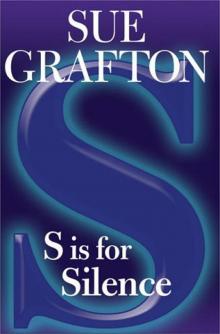 S Is for Silence
S Is for Silence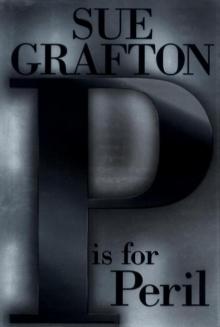 P Is for Peril
P Is for Peril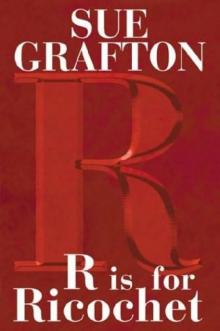 R Is for Ricochet
R Is for Ricochet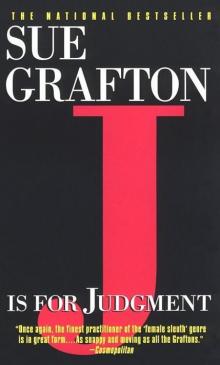 J Is for Judgment
J Is for Judgment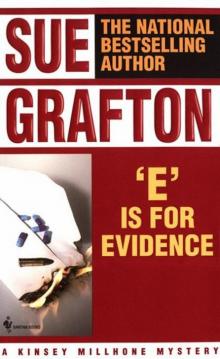 E Is for Evidence
E Is for Evidence T Is for Trespass
T Is for Trespass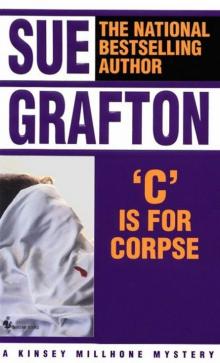 C Is for Corpse
C Is for Corpse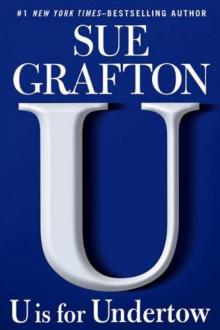 U Is for Undertow
U Is for Undertow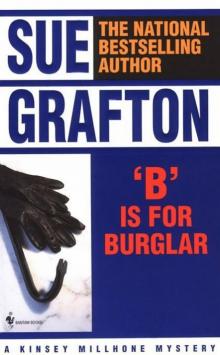 B Is for Burglar
B Is for Burglar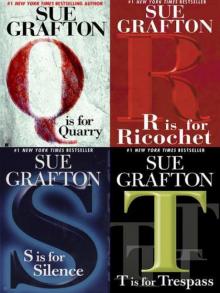 Four Sue Grafton Novels
Four Sue Grafton Novels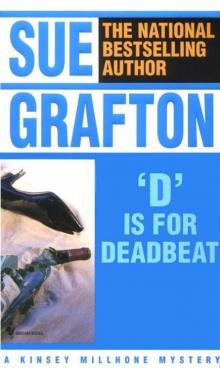 D Is for Deadbeat
D Is for Deadbeat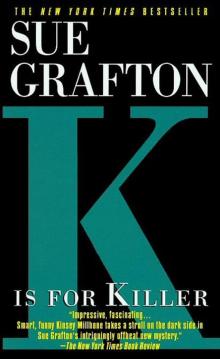 K Is for Killer
K Is for Killer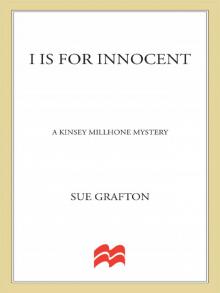 I Is for Innocent
I Is for Innocent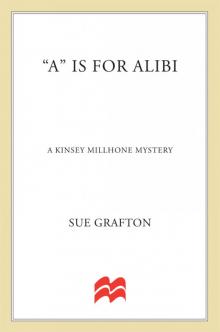 A Is for Alibi
A Is for Alibi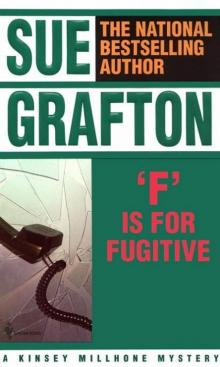 F Is for Fugitive
F Is for Fugitive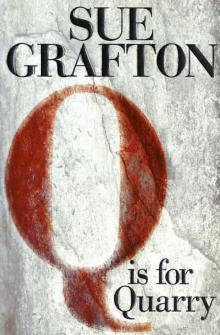 Q Is for Quarry
Q Is for Quarry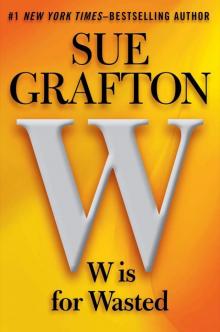 W Is for Wasted
W Is for Wasted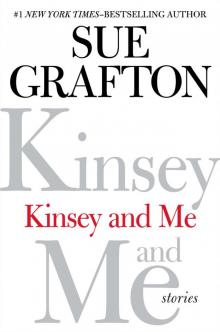 Kinsey and Me: Stories
Kinsey and Me: Stories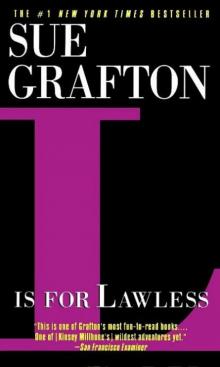 L Is for Lawless
L Is for Lawless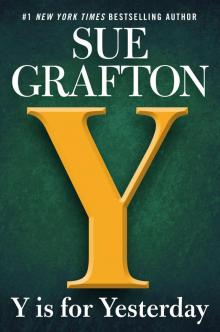 Y Is for Yesterday
Y Is for Yesterday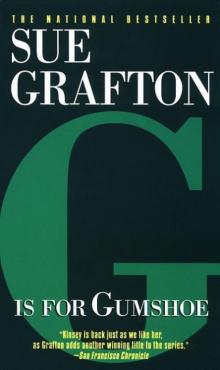 G Is for Gumshoe
G Is for Gumshoe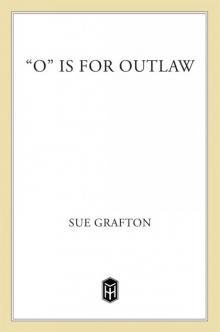 O Is for Outlaw
O Is for Outlaw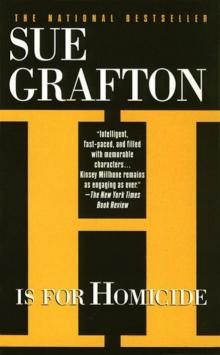 H Is for Homicide
H Is for Homicide X
X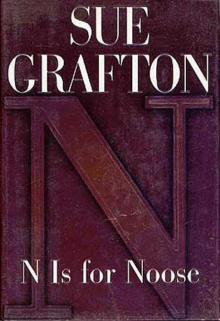 N Is for Noose
N Is for Noose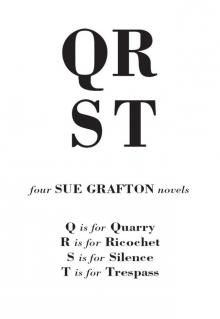 Three Complete Novels: A Is for Alibi / B Is for Burglar / C Is for Corpse
Three Complete Novels: A Is for Alibi / B Is for Burglar / C Is for Corpse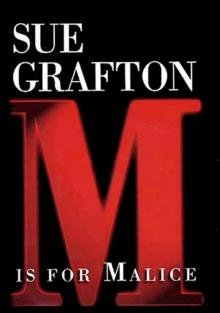 M Is for Malice
M Is for Malice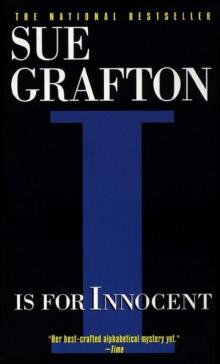 I is for INNOCENT
I is for INNOCENT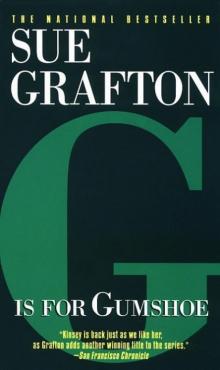 G is for GUMSHOE
G is for GUMSHOE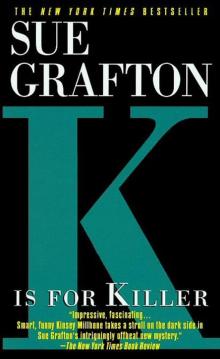 K is for KILLER
K is for KILLER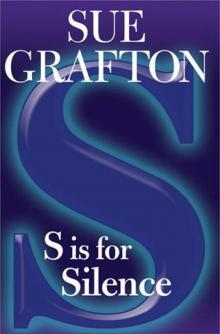 S is for SILENCE
S is for SILENCE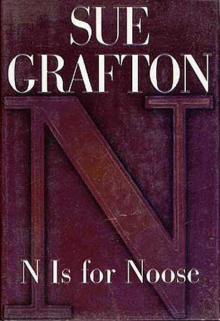 N is for NOOSE
N is for NOOSE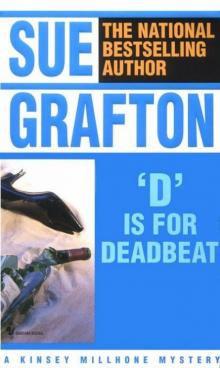 D is for DEADBEAT
D is for DEADBEAT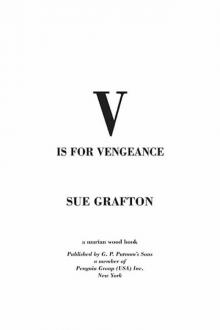 V is for Vengeance
V is for Vengeance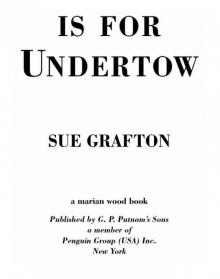 U is for Undertow
U is for Undertow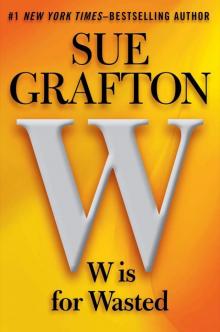 W Is for Wasted km-23
W Is for Wasted km-23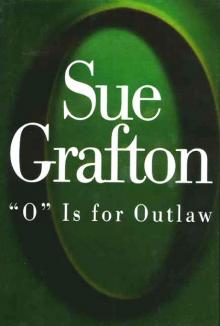 O is for OUTLAW
O is for OUTLAW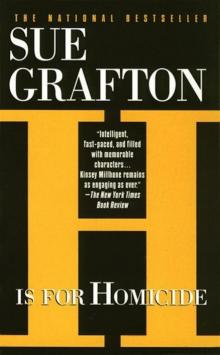 H is for HOMICIDE
H is for HOMICIDE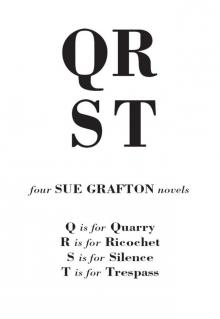 Sue Grafton Novel Collection
Sue Grafton Novel Collection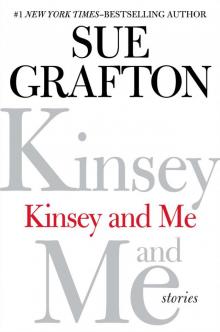 Kinsey and Me
Kinsey and Me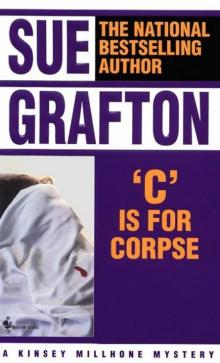 C is for CORPSE
C is for CORPSE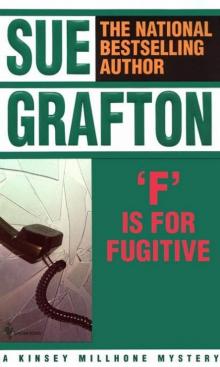 F is for FUGITIVE
F is for FUGITIVE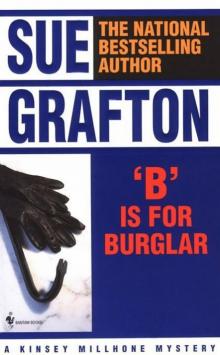 B is for BURGLAR
B is for BURGLAR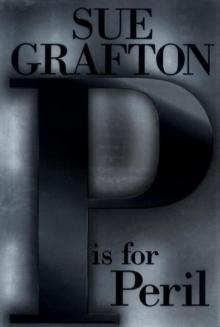 P is for PERIL
P is for PERIL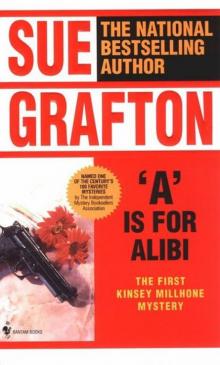 A is for ALIBI
A is for ALIBI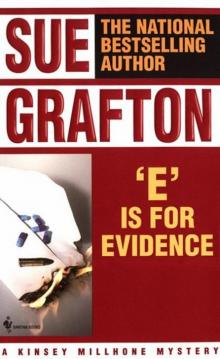 E is for EVIDENCE
E is for EVIDENCE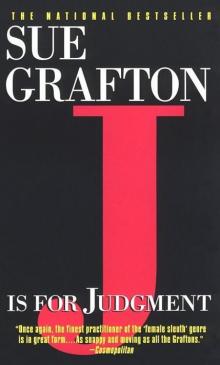 J is for JUDGMENT
J is for JUDGMENT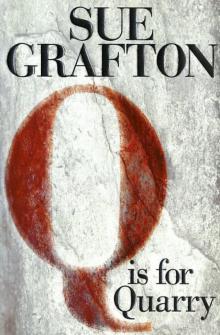 Q is for QUARRY
Q is for QUARRY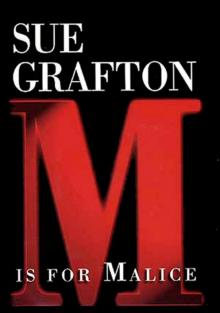 M is for MALICE
M is for MALICE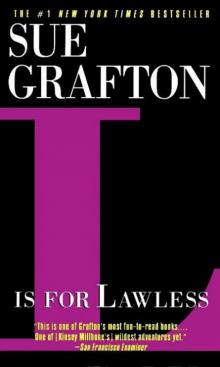 L is for LAWLESS
L is for LAWLESS